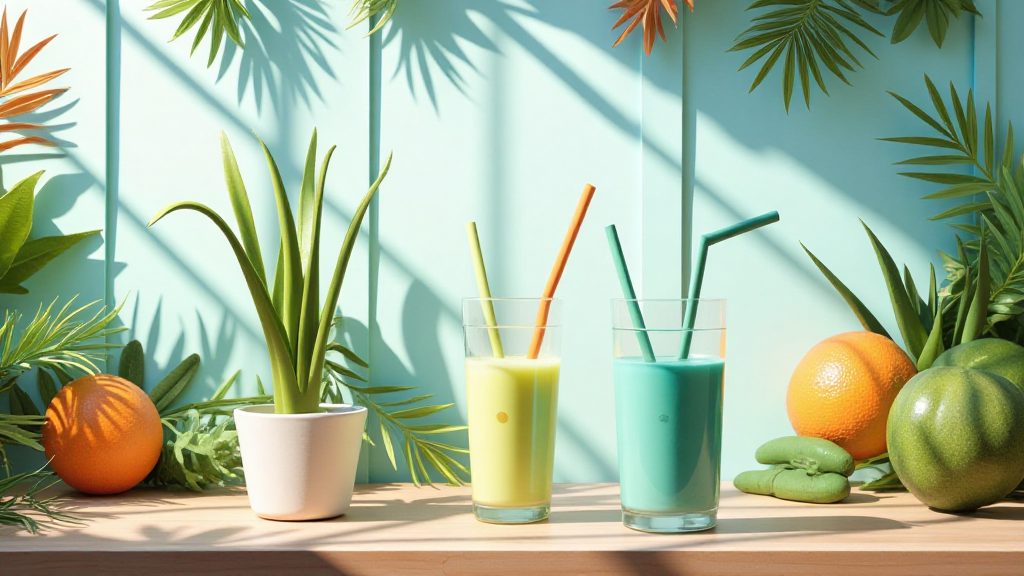
Top 10 Best-Selling Compostable Straws in 2025
1. Renouvo Sugarcane Bagasse Straws
- 材料: Sugarcane fiber (bagasse)
- 主な特徴: Heat-resistant (up to 85°C), PLA-free, PFAS-free, marine-degradable. Retains rigidity for up to 12 hours in liquids. This exceptional heat resistance makes them ideal for serving hot beverages like coffee and tea without compromising structural integrity. Consider the potential for reduced waste compared to plastic straws that often warp or melt in hot liquids.
- こんな方に最適: Restaurants, cafes, and businesses serving hot beverages.
- 認証: BPI-certified home compostable. This certification ensures the straws will fully decompose in a home composting environment, minimizing environmental impact.
- Price: $10–$12 per 100-pack. This price point allows for a cost-effective transition to sustainable alternatives without significantly impacting profit margins.
2. Green Paper Products PHA Straws
- 材料: Polyhydroxyalkanoates (PHA) from plant oils. PHA is a biodegradable thermoplastic known for its environmental friendliness.
- 主な特徴: Marine-degradable within 180 days; suitable for cold drinks. The rapid marine degradation is particularly beneficial for businesses near coastlines or waterways, minimizing the risk of marine pollution.
- こんな方に最適: Coastal venues, waterfront restaurants, and businesses located near bodies of water.
- 認証: CMA-certified. This certification validates the claims of biodegradability and marine-friendliness.
- Price: $15–$18 per 200-pack. While slightly more expensive than some alternatives, the environmental benefits and targeted market justify the cost.
3. UrthPact Home-Compostable PLA Straws
- 材料: Corn-based PLA (polylactic acid). PLA is a common material in compostable products, offering a familiar texture and feel.
- 主な特徴: Industrial-compostable within 90 days; mimics traditional plastic texture. The familiar texture makes the transition smoother for customers accustomed to plastic straws.
- こんな方に最適: Fast-food chains, smoothie shops, and businesses serving thick beverages like milkshakes. The smooth texture is crucial for optimal beverage enjoyment.
- 認証: BPI-certified. BPI certification guarantees industrial compostability in commercial facilities.
- Price: $8–$10 per 50-pack. This is a highly competitive price point, making it attractive to businesses with high straw consumption.
4. EcoCycle Certified Paper Straws
- 材料: FSC-certified paper. FSC certification ensures responsible forest management practices.
- 主な特徴: Budget-friendly but less durable (lasts ~1 hour in liquids). While less durable, their affordability makes them suitable for specific applications.
- こんな方に最適: Cafés, quick-service restaurants, and events with short beverage service times. The lower durability makes them a cost-effective option for situations where beverages are consumed quickly.

Choosing Sustainable Sugarcane Straws for Your Business

Businesses are increasingly seeking eco-friendly alternatives to plastic straws. Sugarcane straws offer a compostable and sustainable solution, reducing your environmental impact. The initial investment in compostable straws is often offset by the lower cost and positive brand image.
Many businesses are switching to compostable alternatives like sugarcane straws to reduce their reliance on plastic. This shift demonstrates a commitment to sustainability and resonates with environmentally conscious customers.
Choosing Compostable Straws: Key Considerations for Businesses
Several factors influence the choice of compostable straws for businesses. These include the material’s source, certifications, price point, and suitability for the business’s specific needs and target market.
Sustainable Straw Options for Businesses
The market offers a variety of compostable straws made from different materials, each with its own set of advantages and disadvantages. Let’s explore some popular options.
5. VeggieStraws Edible Rice Straws
- 材料: Rice flour and tapioca. These edible straws offer a novel approach to sustainability.
- 主な特徴: Edible, gluten-free; dissolves in liquids after ~45 minutes. This eliminates the need for disposal, simplifying waste management.
- こんな方に最適: Juice bars, children’s events, and businesses catering to health-conscious consumers. The novelty and edibility are significant selling points.
- 認証: Biodegradable. While less specific than other certifications, this indicates the product’s environmentally friendly nature.
- Price: $12–$15 per 50-pack. The price reflects the unique features and targeted market.

6. Agave Fiber DuraStraws
- 材料: Upcycled agave plant waste. This upcycling approach reduces waste and promotes sustainable agriculture.
- 主な特徴: Retains structure for 24 hours; works in hot/cold drinks. The extended durability makes them suitable for a wide range of beverages.
- こんな方に最適: Hotels, resorts, and businesses emphasizing luxury and sustainability. The longer lifespan justifies the higher price.
- 認証: FSC-certified. FSC certification adds credibility and demonstrates responsible sourcing.
- Price: $20–$25 per 100-pack. The higher price reflects the premium quality and extended durability.

Choosing Sustainable Straws for Your Business: Compostable vs. Reusable
Switching from plastic straws to eco-friendly alternatives is a crucial step for businesses committed to sustainability. This guide helps businesses navigate the options, considering factors like cost, durability, and environmental impact. Key considerations include the type of compostable straw (e.g., sugarcane bagasse), the availability of composting infrastructure, and the alignment with your brand’s values. Let’s explore these factors:
- Budget: Prices vary significantly depending on the material (e.g., sugarcane, PLA) and order volume.
- 耐久性: Consider the beverage type (hot or cold) and service time required.
- 認証: Ensure compliance with relevant compostable standards for your region.
- Brand Alignment: Select straws that align with your brand’s sustainability goals and resonate with your target market.
- Composting Infrastructure: Ensure access to appropriate composting facilities, whether industrial or home composting.
By carefully considering these factors, businesses can choose the most suitable compostable straws, minimizing their environmental impact and enhancing their brand image. The transition to compostable straws, such as those made from sugarcane, is not merely a trend; it is a responsible step towards a more sustainable future.

Many businesses are now actively seeking compostable alternatives to plastic straws, recognizing the significant environmental benefits. Choosing the right option requires careful consideration of several key factors.
Product Overview:
- Compostable Straws (Sugarcane): Minimum order of 1000 units. Ideal for corporate events or large-scale catering. Price: $7–$9 per 100-pack (prices decrease with volume).
- 再利用可能なストロー: Individual pricing varies widely depending on the material (stainless steel, glass, etc.) and vendor. Consider the long-term costs including purchase price, cleaning supplies, and potential replacement costs.
Comparison Table:
| 要素 | Compostable Straws (Sugarcane) | 再利用可能なストロー | ノート |
|---|---|---|---|
| 環境にやさしい | Break down in months (90-180 days in industrial composting); no microplastics. | Higher initial carbon footprint due to manufacturing and transportation. Long-term environmental impact depends heavily on usage and proper disposal. | Compostable straws significantly reduce landfill waste and marine pollution. Reusable straws’ environmental benefit is contingent on extended lifespan and responsible cleaning/recycling. |
| 料金 | $7–$9 per 100-pack (volume discounts available). Lower upfront cost for large events. | Higher upfront cost per straw. Long-term cost depends on frequency of use and replacement needs. Consider the cost of cleaning supplies and potential replacements. | Bulk purchasing of compostable straws significantly reduces per-unit cost. Reusable straws may offer long-term cost savings if used frequently. |
| 耐久性 | Single-use; lasts for several hours in liquids, depending on material and temperature. | Years with proper care and cleaning. | Modern compostable straws (e.g., sugarcane bagasse) maintain structural integrity in hot drinks for extended periods. |
| Convenience | Convenient for single-use events; disposal is straightforward in composting facilities. | Requires cleaning and storage; may be less convenient for large-scale events. | Consider the convenience for your specific needs and operational setup. |

Compostable Straws: The Sustainable Choice for Events
Compostable straws offer unparalleled convenience for high-volume events. No cleaning required; ideal for events and quick-service settings. Reusable straws require a dedicated cleaning and storage system; this may be inconvenient for large-scale events or on-the-go use.

Verdict: Compostable vs. Reusable Straws for Businesses
Compostable straws are best suited for events and businesses prioritizing immediate waste reduction and convenience. Reusable straws are a more sustainable option in the long run for individual consumers or businesses with robust cleaning and maintenance protocols. The ideal choice depends on your business model, target audience, and sustainability goals.
Why Switch to Compostable Sugarcane Straws for Your Business?
-
Environmental Impact of Compostable Straws
Compostable straws significantly reduce environmental impact compared to plastic. They decompose within 90–180 days in industrial composting facilities, while plastic straws persist for over 200 years. This translates to a 60%+ reduction in landfill waste and a 30% decrease in carbon emissions compared to plastic production. Furthermore, PHA-based compostable straws degrade harmlessly in oceans, protecting marine life. Consider the positive brand image associated with actively reducing your environmental footprint.
-
Cost Savings with Compostable Straws
Bulk purchasing of compostable straws offers significant cost savings (20–40%) compared to plastic alternatives. Additionally, switching to compostable straws helps businesses avoid penalties associated with single-use plastic bans implemented in many jurisdictions. Factor in the potential savings on waste management fees and the avoidance of fines.
-
Boost Your Brand Reputation with Sustainable Choices
A growing number of consumers (78%) prefer businesses that utilize eco-friendly packaging. Switching to compostable straws enhances your company’s Corporate Social Responsibility (CSR) profile, attracting environmentally conscious customers and investors.
Addressing Common Concerns About Compostable Straws
Durability Myths: Are Compostable Straws Strong Enough?
Early compostable straws suffered from sogginess issues. However, modern options made from sugarcane bagasse or PHA remain rigid for 8–24 hours in both hot and cold drinks. Renouvo’s sugarcane straws, for example, are known for their durability, even with hot lattes.
Cost Misconceptions: The True Cost of Compostable Straws
While the initial cost per compostable straw ($0.08–$0.20) is higher than plastic ($0.01), businesses realize long-term savings through reduced waste management fees and increased customer loyalty. The long-term cost savings often outweigh the initial investment.
Frequently Asked Questions about Compostable Straws
Claim Your Free Consultation
Ready to make the switch to compostable straws? Many manufacturers offer free samples, enabling businesses to evaluate.

Product Suitability Before Committing to Bulk Orders of Compostable Straws
For example, Renouvo provides complimentary packs of their sugarcane bagasse straws, allowing you to assess durability and operational compatibility. Green Paper Products offers trial packs of their PHA straws, particularly beneficial for businesses near coastal areas. These samples allow for a risk-free trial, enabling informed purchasing decisions.
Case Studies: Successful Compostable Straw Transitions for Businesses
Case Study 1: The Green Café’s Transition to Compostable Sugarcane Straws
The Green Café, a California-based coffee chain, adopted Renouvo’s sugarcane bagasse straws in early 2024. Within six months, they experienced a 25% increase in customer satisfaction, directly attributed to their eco-friendly initiative. Concurrently, they achieved annual cost savings of $1,200 by reducing waste management fees. This demonstrates the potential for both enhanced brand image and financial benefits.
Case Study 2: Ocean Breeze Resort’s Success with Marine-Degradable Straws
Ocean Breeze Resort in Florida implemented Green Paper Products’ PHA straws in their beachside bar. The straws’ marine-degradable properties perfectly aligned with the resort’s ocean conservation commitment. Following implementation, the resort saw a 15% increase in bookings from environmentally conscious travelers and garnered positive media attention for its sustainability efforts, highlighting the potential for increased revenue and positive publicity.
Actionable Insights for Businesses Considering Compostable Straws
- Conduct a Thorough Needs Assessment: Analyze your beverage offerings (hot, cold, or both) and anticipated usage duration to select the optimal compostable straw. Consider factors such as straw length, diameter, and material strength. For instance, a thicker sugarcane bagasse straw might be suitable for thick smoothies, while a thinner PHA straw might be ideal for iced tea.
- Leverage Bulk Discounts and Negotiate Pricing: Many manufacturers offer substantial discounts for bulk orders. Explore volume-based pricing options to optimize your cost-effectiveness. Negotiating contracts can also lead to favorable pricing structures, especially for large-scale orders.
- Factor in Waste Management Costs: Assess your current waste management fees and project potential savings from reduced waste disposal associated with compostable straws. Many municipalities offer incentives or reduced fees for businesses utilizing compostable materials.
- Communicate Your Commitment to Sustainability: Highlight your switch to compostable straws in your marketing materials and on your website. This demonstrates your commitment to environmental responsibility and can attract environmentally conscious customers.
- Sustainability Commitment: Actively promote your switch to compostable straws through marketing materials, social media, and in-store signage. Highlight the environmental benefits and your commitment to sustainability to resonate with environmentally conscious consumers. This can significantly enhance your brand image and attract new customers.
- Explore Compostable Straw Options: Investigate various compostable straw materials (e.g., sugarcane bagasse, PLA, PHA) to determine the best fit for your business needs and local composting infrastructure. Consider factors such as biodegradability rate, cost, and availability.
- Pilot Test Before Full Implementation: Before committing to a large-scale transition, conduct a small-scale pilot test using free samples from various manufacturers. This allows you to evaluate product performance, customer feedback, and operational efficiency before a full-scale switch.

Sample Pack Today!
Ready to test top-selling compostable straws? Contact us at sales@naturebioeco.com for a free sample kit (including Renouvo sugarcane, PHA marine-degradable, and other options!). Join 500+ businesses that have reduced plastic waste by 80%—make a guilt-free switch today!
Discover the Future of Sustainable Packaging with Our Free Sample Kit
Why Choose Compostable Sugarcane Straws Over Plastic?
The global shift towards sustainable packaging is crucial. The Ellen MacArthur Foundation’s 2023 report highlights that over 8 million tons of plastic enter our oceans annually, with single-use plastics like straws being a major contributor. Switching to compostable alternatives like sugarcane straws reduces your environmental footprint and aligns with consumer preferences. A Nielsen study reveals that 73% of global consumers are willing to modify their habits to reduce environmental impact. This presents a significant market opportunity for businesses embracing sustainable practices.
Join 500+ Businesses Leading the Change with Compostable Straws
Our clients have achieved remarkable sustainability progress. A leading European café chain reduced plastic waste by 80% after adopting our compostable straws. Similarly, a Southeast Asian hotel group reported a 65% increase in customer satisfaction after introducing them. These successes demonstrate the tangible benefits of transitioning to eco-friendly alternatives. Eco-friendly packaging options are no longer a niche concern; they’re a business imperative. This case study demonstrates that sustainable practices benefit both your bottom line and the planet. Our free sample kit provides a tangible way to explore these advantages.
What’s Included in the Free Sample Kit?
Our comprehensive sample kit facilitates informed decision-making. It contains:
- Renouvo Sugarcane Straws: Crafted from renewable sugarcane fibers, these straws offer exceptional durability and are fully compostable, suitable for both hot and cold beverages. Their strength rivals traditional plastic straws, ensuring a positive customer experience. For example, a cafe switching to these straws might find minimal complaints about breakage or flimsy construction, maintaining customer satisfaction while promoting sustainability.
-
PHA Marine-Degradable Straws: A Sustainable Solution for Businesses
Specifically engineered for marine biodegradation, these PHA straws are a responsible choice for businesses near coastal areas or those prioritizing ocean conservation. These compostable straws represent a significant advancement in reducing ocean plastic pollution. A beachside restaurant, for instance, could use these sugarcane-based straws to minimize its environmental impact and appeal to environmentally conscious customers.

-
Compostable Straw Options for Every Business
We offer a range of compostable alternatives to plastic straws to suit diverse needs. This includes various materials and sizes, ensuring compatibility with different beverage types and serving styles. We can help you select the best option for your specific application, considering factors like beverage temperature, usage frequency, and local composting infrastructure. Our sugarcane straws are a popular choice.
Why Choose Compostable Sugarcane Straws?
Transitioning to compostable straws is straightforward and offers substantial rewards. Our free sample kit allows you to assess the performance, durability, and environmental benefits firsthand. Simply compare the performance of our straws to your current plastic option—consider factors like breakage rate, customer feedback, and disposal ease.
Consider the potential cost savings. While initial costs may seem higher, the long-term benefits of reduced waste disposal fees and enhanced brand image can offset these costs. Many municipalities offer incentives for businesses adopting sustainable practices.

Make the Switch to Compostable Straws Today!
Join numerous businesses already reducing plastic waste and adopting eco-conscious practices. Switching to our compostable straws helps you meet evolving regulatory requirements, enhance your brand reputation by showcasing your commitment to sustainability, and contribute to a healthier planet without compromising quality. This improved brand image can attract environmentally aware consumers and investors.

Contact us now at sales@naturebioeco.com to request your free sample kit and embark on a journey towards a greener and more profitable future. We’re happy to discuss your specific needs and recommend the ideal compostable straw solution for your business.
サトウキビのストローについてよくある質問
Q: What are the benefits of using compostable straws?
Compostable straws offer numerous benefits, including reduced plastic waste, a positive impact on the environment, and enhanced brand image. They are a sustainable choice that aligns with environmentally conscious consumers.
Q: How do I choose the right compostable straw for my business?
Consider factors like material, certifications, price, and best use case when selecting compostable straws. Look for certifications like BPI to ensure proper composting and choose a material that aligns with your business needs and values. The price per unit should also be considered in relation to the overall cost-effectiveness and brand image.
Q: What are compostable straws made of?
Common materials include sugarcane bagasse (plant fiber), PLA (corn starch), PHA (vegetable oils), and FSC-certified paper.
Q: Do compostable straws work in hot drinks?
Sugarcane and agave straws withstand temperatures up to 85°C. Paper straws degrade faster in hot liquids.
Q: Are compostable straws certified home-compostable?
Certification varies by brand and material. Check the packaging for specific certifications. Industrial composting is generally recommended for optimal decomposition.
Q: How long do compostable sugarcane straws take to decompose?
90–180 days in industrial facilities; home composting may take up to a year, depending on conditions.
Q: Are “biodegradable” and “compostable” the same?
No. Biodegradable materials may leave behind microplastics, while compostable materials fully break down into nutrient-rich soil without harmful residue.







